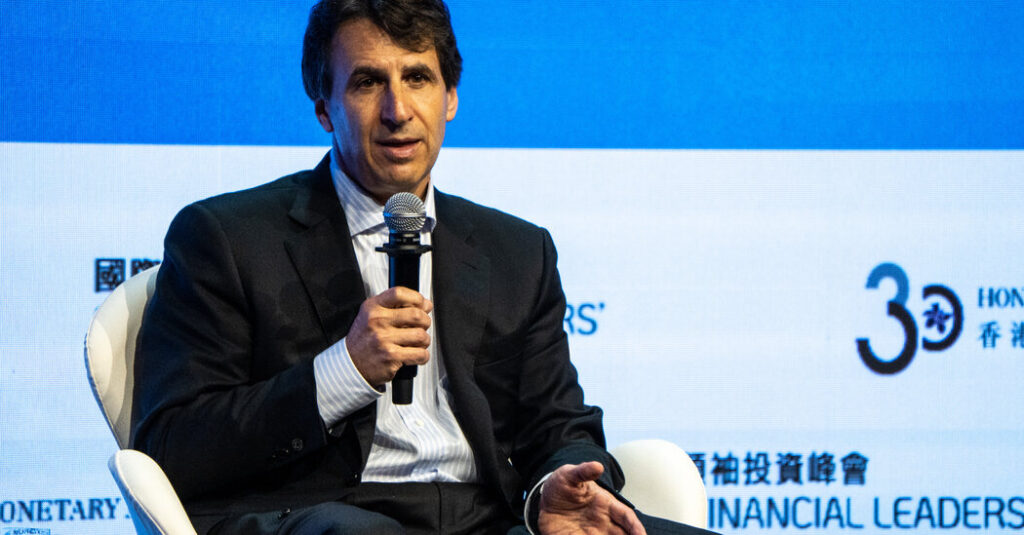The ultrawealthy have long lorded their money and might over university presidents, pelting them with ideas and demands, promises and threats.
Now they have an ally in the White House.
President Trump embraced a billionaire’s strategy to try to wring ideological concessions from universities. He blessed another’s role as Harvard University’s emissary for negotiations with the federal government. Yet another billionaire helped steer cuts at the Department of Education — which a different billionaire leads.
Mr. Trump’s approach represents a shift in how wealthy people are shaping higher education. Some of the moneyed voices Mr. Trump has elevated have, in the name of encouraging open debate, sought to expunge progressive orthodoxy from academia and tilt campuses rightward. And since Mr. Trump has taken office, the president and his allies have pursued an aggressive campaign to realize their vision, including reshaping the relationship between the federal government and the nation’s colleges and universities.
The campaign is accelerating. But it has been in the works for years.
In 2023, the hedge fund manager Bill Ackman and the private equity titan Marc Rowan tested a new way of wielding power over their alma maters, with nationally vocal — and ultimately successful — campaigns to oust the leaders of Harvard and the University of Pennsylvania.
Mr. Ackman’s social media jeremiads about diversity, equity and inclusion catalyzed a debate that Mr. Trump began turning into policy soon after he returned to Washington. And this fall, Mr. Rowan, whose business interests include the for-profit University of Phoenix, was a leading force behind the Trump administration’s quest for a “compact” with universities that could have tied federal funding to fealty to Mr. Trump’s ideology.
Their prescriptions for campuses have often drawn fire from higher education leaders, including presidents and chancellors who believe academia needs to listen to some of its critics.
“My experience with billionaires is they do not suffer from humility,” said Janet Napolitano, who was homeland security secretary during the Obama administration and later the president of the University of California. “They think they’ve made fortunes, they’re making fortunes, there’s a kind of a we-know-it-better-than-you-do.”
But figures like Mr. Rowan have argued that universities are not doing enough to change themselves and that outside forces like the federal government have roles to play.
“Many colleges and universities, and especially some of the oldest and traditionally prestigious schools, are burdened with archaic governance structures that make self-reform all but impossible,” he wrote in a guest essay in The New York Times in October. “This means that course correction must come from the outside.”
Mr. Trump has embraced that view for higher education — envisioning significant power for Washington and vast sway for the outsiders shaping his own policies.
The White House has defended Mr. Trump’s approach, arguing that the wealthy have long influenced and improved American colleges and universities. Administration officials say that without the kinds of changes that figures like Mr. Rowan have championed, American higher education will erode.
In some respects, Mr. Trump’s loose kitchen cabinet on campus issues is clarifying for higher education officials. For months, many of them have struggled to gain clear insights into the White House’s thinking, with even some of the schools that the Trump administration targeted for funding cuts receiving only the tersest of explanations.
But they are interpreting the rise of figures like Mr. Rowan and Stephen A. Schwarzman, the Blackstone chief executive who is involved in the Harvard talks, as hints about how Mr. Trump might approach education issues and how they might be able to bend the president’s ear.
Some wonder, though, whether Mr. Trump is giving too much sway to higher education’s critics.
“Anyone is entitled to express their feelings about universities, to condemn universities,” said Lee C. Bollinger, who led both Columbia University and the University of Michigan. “But at some point, the level of influence is just way out of proportion to the merits of their claims.”
In circles like Mr. Bollinger’s, no Trump-aligned billionaire may be of greater concern and consequence than Mr. Rowan.
Apollo Global Management, where Mr. Rowan is chief executive, has for years held education-related investments, including a big stake in the University of Phoenix, a titan in the for-profit college industry that has drawn broad scrutiny for quality and cost concerns.
The University of Phoenix has itself been a prime example of many of the problems that Mr. Rowan has highlighted in his attacks on academia. Its graduation rates are modest, and its alumni tend to earn low salaries and have high debt, much of it federally financed.
According to the most recent edition of the Department of Education’s College Scorecard, the school’s graduation rate was 25 percent; the national midpoint for four-year colleges was 58 percent. Ten years after enrolling, median earnings for students were $37,752; the national midpoint for four-year schools was $53,747. But the university’s average annual cost, $13,571, was much lower.
While recent Democratic presidential administrations have clamped down on abuses by for-profit colleges and promoted more regulation of the industry, Mr. Trump has been more supportive.
“The debate about higher education often overlooks the reality that different institutions serve different types of students,” said Andrea Smiley, a spokeswoman for the University of Phoenix, who defended the school and said it was “built for the needs of adult learners who juggle the demanding pursuit of education along with the responsibilities of working and caring for their families.”
A spokesman for Mr. Rowan said the University of Phoenix’s performance had improved since Apollo, which maintains a controlling interest despite a recent public offering, took over in 2017. But academics note a contradiction in his efforts to steer higher education.
Lorena Grundy, a practice assistant professor at the University of Pennsylvania, recently joined a protest organized by the American Association of University Professors outside Apollo’s headquarters.
“He is not doing anything to make higher education more affordable, more accessible,” she said of Mr. Rowan, noting the debt owed by University of Phoenix students.
But Mr. Rowan has displayed an interest in upending traditional institutions.
Days after Mr. Trump’s inauguration last winter, Mr. Rowan told an audience at the Park Avenue Synagogue that he did not “think one needs to go and change thousands of universities. I think you need to change five.”
Two years ago, Mr. Rowan was focused on one: Penn.
Mr. Rowan — an alum who had become chairman of the Penn business school’s advisory board — had vast sway in Philadelphia. But when his efforts to influence the university on issues he viewed as related to antisemitism were rebuffed, he moved to push out its president, M. Elizabeth Magill.
Mr. Rowan, a staunch supporter of Israel, urged other top donors to withhold gifts and bombarded trustees with daily emails. Ms. Magill eventually resigned, days after she testified at a congressional hearing where university leaders drew widespread criticism for answers that appeared legalistic and aloof.
Looking back, supporters and critics of Mr. Rowan view the episode as an instructive glimpse at the Apollo co-founder’s willingness to deploy hard-nosed, rapid-fire tactics against a typically deliberative academic world.
In Mr. Rowan’s view, that world had grown unaccountable and unchecked. Even university power brokers like himself, Mr. Rowan explained during his synagogue speech, had been “too cowed to say anything because we didn’t want to offend women, people of color, people of minority status, of different sexual orientations or anything else.”
Mr. Trump’s re-election gave him a new opening. Trump officials talked about stripping funds from schools they viewed as wayward. But Mr. Rowan also said at the synagogue that he wanted to reimagine “the circumstances under which we would fund these universities.”
Working with allies that his aides have refused to identify, Mr. Rowan helped devise a proposal that, among other conditions, called for schools to “recognize that academic freedom is not absolute” and to banish considerations like gender, political views or sexual orientation from admissions and hiring decisions.
An unsigned copy of the proposal circulated quietly in higher education circles last winter, alarming some who wondered whether it was a blueprint for a future Trump administration move.
It was.
On Oct. 1, the White House sent nine schools a document that administration officials said could lead to more federal funding for schools that signed onto its ideas. Large segments of it were a word-for-word replica of a document Mr. Rowan helped write, while other sections closely resembled it.
Mr. Rowan even had a hand in picking which schools the administration would solicit for feedback, though federal officials asserted the proposal was “largely in its final form.”
The backlash was, especially by academia’s standards, swift and harsh. Of the nine schools the government originally contacted, seven flatly rejected the proposal, with many citing concerns about ceding their independence. Another appeared to express misgivings about some of the ideas.
Last month, Mr. Rowan joined a White House call to hear from university leaders directly. Although he spoke more than some Trump aides on the call, according to three people familiar with his activities, he did not appear to change many minds.
A White House official, who spoke on the condition of anonymity to discuss the Trump administration’s strategy, argued that wealthy people had long shaped American institutions for the better and that Mr. Rowan’s role in the policymaking process was a natural extension of that.
The White House has vowed to regroup in the wake of the October call and, according to four people familiar with the deliberations, has signaled that it could rewrite the proposal in significant ways. But the administration missed its original goal of having a signed deal by Friday.
Still, the influence of Mr. Rowan does not appear to be waning: In November, he was among the attendees at a private dinner at the White House. Mr. Schwarzman, who some higher education officials regard as a potential ally in debates about the future of research funding, was there, too.
But Barmak Nassirian, a vice president for Veterans Education Success, an organization that promotes the G.I. Bill and other kinds of educational assistance for veterans, said he hoped the wealthy figures in Mr. Trump’s world might soon turn their attention elsewhere.
“I kind of yearn,” Mr. Nassirian said, “for the gilded age when billionaires satisfied their extracurricular interests by collecting Fabergé eggs and prized ponies.”
Michael C. Bender contributed reporting from Washington, and Bernard Mokam from New York.
Alan Blinder is a national correspondent for The Times, covering education.
The post Wealthy People Have Always Shaped Universities. This Time Is Different. appeared first on New York Times.




